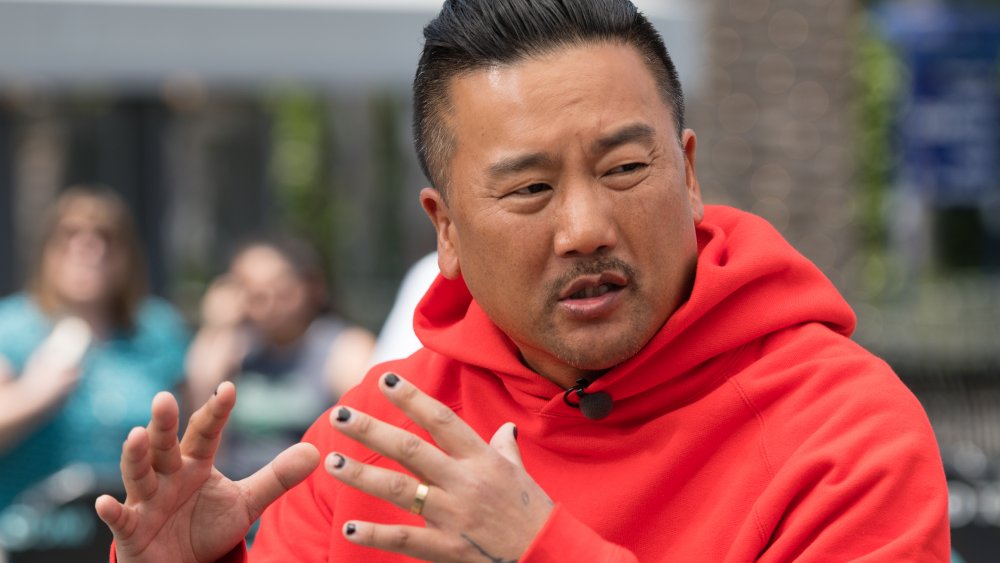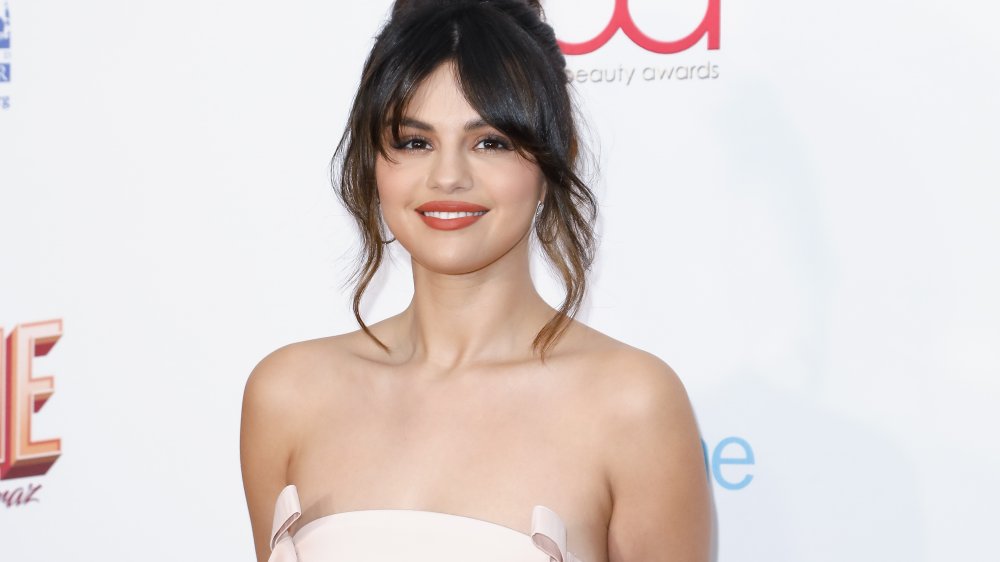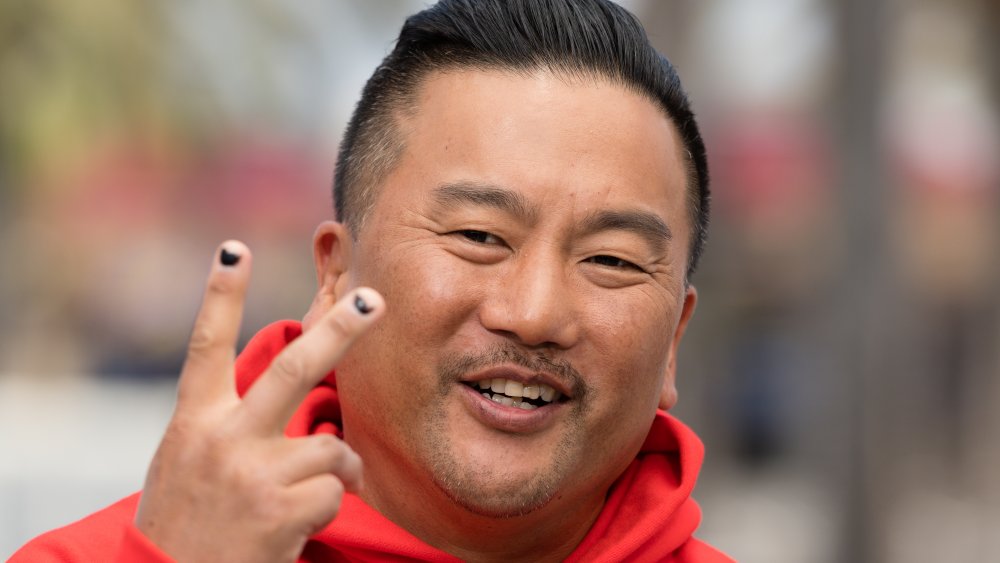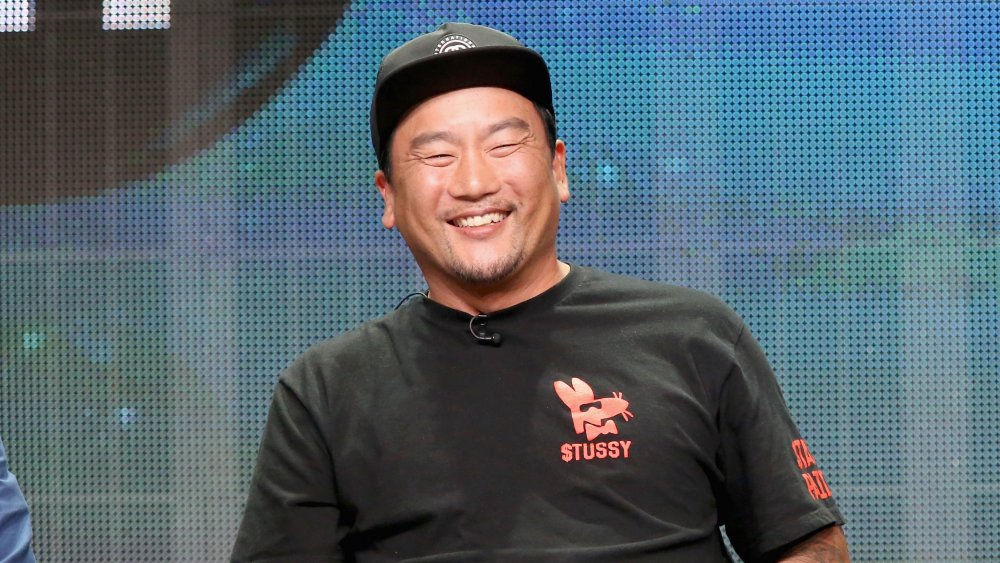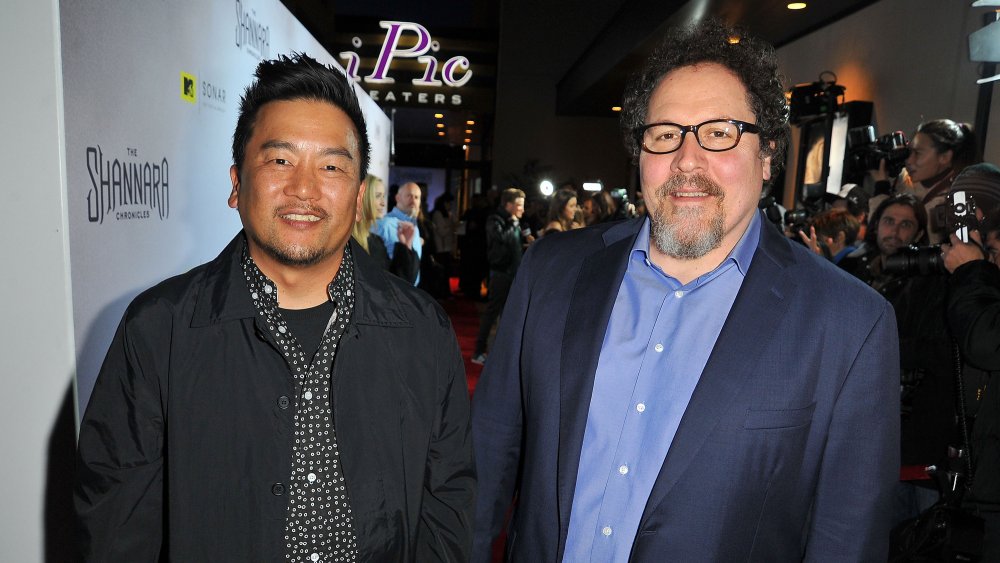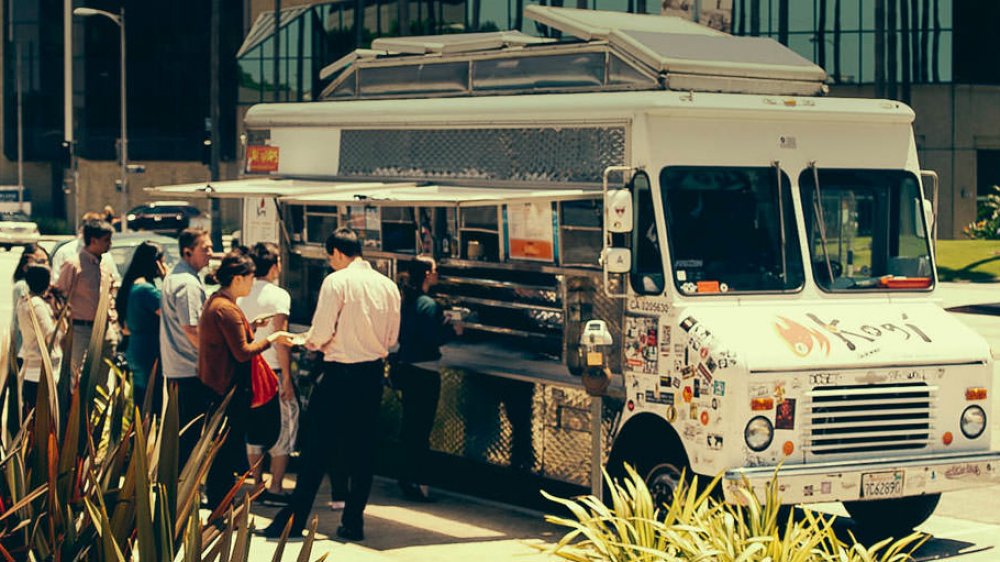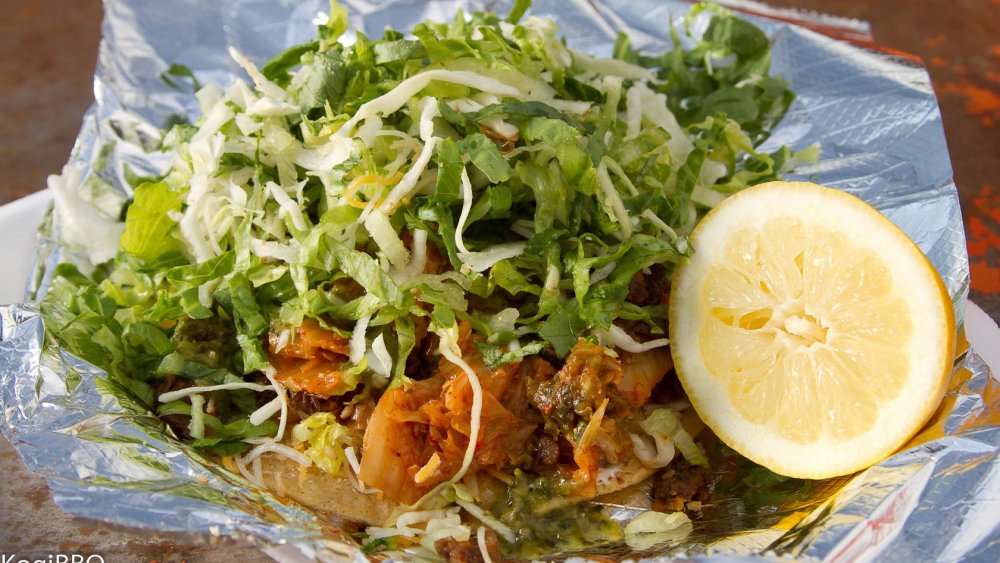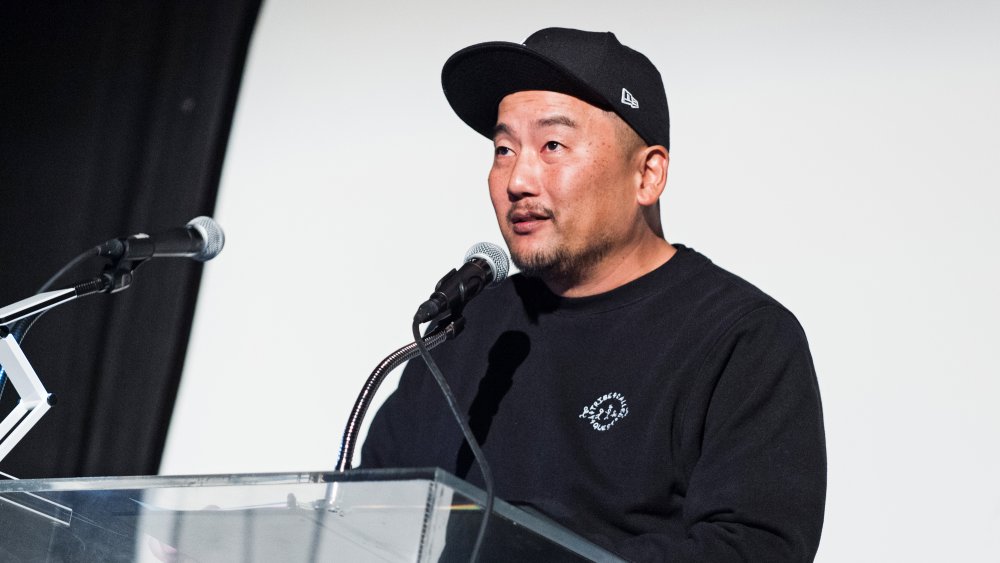Roy Choi On His Unlikely Fame, How To Make The Perfect Taco, And More - Exclusive Interview
When iconic movie director Jon Favreau makes a movie called Chef that's inspired by your life — which is exactly what happened to Kogi BBQ food truck legend Roy Choi — it's pretty safe to say that you have arrived. But Choi — whose Netflix series, The Chef Show, is now in its third season and includes guest appearances by Gweneth Paltrow, Robert Downey, Jr., and Seth Rogen — is really just getting started. His new gig is co-hosting an episode of the new HBO Max Orginal show, Selena + Chef, starring the one and only Selena Gomez. The icing on the cake — or in this case, the cilantro atop the short-rib breakfast taco — is that Choi will have a cameo role in Gomez's upcoming film, Broken Hearts Gallery.
So what's it like to go from taco truck cook to Selena's co-star? In an interview with Mashed, Choi dished on his transformation from fan to star, how it feels to be a role model for the Asian-American community, plus his secret for making the perfect taco.
What it's like to work with Selena Gomez, according to Roy Choi
What was it like teaching Selena Gomez to cook?
[Selena] personally was amazing. She didn't complain about nothing. She was in it. She wasn't just there to be there. She was interested, and she was following the methods, and it's not like we had to slow down for anything, you know what I mean? It was very fluid, just like talking to you right now. It was like, I never had to take it back the notch, it was all in natural form. It was a little awkward at the beginning with the camera situation... But then within five, 10 minutes, we forgot that that thing was even there... She was really good, man.
The most important thing that I cared about was that she was interested. She was interested in this — it wasn't a fake thing. It wasn't a fake show. And so, it was really important to make sure that she does the prep all the way through, not just opening a container and heating it up.
Have you ever taught anyone to cook remotely before like that?
In the pandemic, I've been doing a few of these Zoom coaching classes for people, where they have a recipe, or teaching a cooking class, but I'm not cooking. I'm just sitting here and I'm looking at what they're doing and giving pointers or tips, or, "Hey, watch out, watch that!" So, I'm like a coach. Before the pandemic, I would do cooking demos. So in a sense, a distance type of learning, because if I'm in an amphitheater or an auditorium with hundreds of people. I'm doing one demo and they're watching it and they're watching it on broadcast over the screen, I guess that applies. But that's a little different, because you're projecting to a live audience and which is then recorded, that's distance learning, I guess.
I think [the producers] did a wonderful job, in making it less awkward as it already was. And they really found a way to make you, as a viewer, forget that you and Selena weren't in the same room.
Were there any funny moments from the episode of Selena + Chef that didn't make the cut?
I didn't think the Taylor [Swift] and the cute boy thing were going to make the cut. Kind of little sidebars... everything that we did made the cut, those were the fun moments and those were seemed to be the most viral moments of the episode. Obviously Taylor's, with FaceTiming, and then her with the "Selena Army" and everyone interested about her every move — her actually admitting that it was a cute boy, becoming a little bit discombobulated. I think that was probably a highlight for a lot of our fans, because I don't think she publicly just shares all of her laundry all the time. So that was pretty special for the fans, for her to be in a very honest, candid, unscripted moment, especially around love or relationships. So ours made it, for my episode — all that stuff made it.
Had you ever worked with Selena Gomez, prior to Selena + Chef?
Indirectly I did. I had tiny role in her new movie, that she produced, called Broken Hearts Gallery. So that's a movie that was written and directed by Natalie Krinsky, and last year, I got asked to do a cameo. The main actors in the movie are Dacre Montgomery. He plays Billy in Stranger Things. And then Geraldine. I'm always mispronouncing that. I think it's Viswanathan. [Editor's note: It is!] But I could be wrong. Don't hate me, Geraldine... So I played a cammy. I was one of the taker's best friends in the movie. The movie is executive produced by Selena Gomez. I've met her before, but I was indirectly involved.
Roy Choi on his path from fan to fame
What has it been for you to work with celebrities like Selena Gomez and Jon Favreau?
It's weird, but also natural at the same time. It's weird because I'm a fan first, of other things. My life changed just over a decade ago to become this, whatever it is, this public figure or [to be] even known beyond my friend groups. So up until that time, being an unknown person publicly, I was a fan, so I'm a hardcore fan of all the people that I've met and even more.
But, so the first part was weird because by breaking the fourth wall, I didn't want to ruin whatever images or ideas I had with people — because I wasn't exposed to that environment before. So I had no reference. But Kogi, which is our taco truck, that threw me into the deep end of life. It wasn't like I even had time to prepare or I had to even contemplate whether or not I belonged in this place or this moment or time or anything! It was very much maybe a YouTube star or a TikTok star becoming famous overnight.
You wake up to the moments, and you can either rise to the moment and be the moment, or you can constantly be in denial, or feel some sort of guilt or shame towards the moment, or maybe have difficulty with it. But for me, I woke up in the moment of this kind of crazy, revolution of food.
Sometimes, things happen like a light switch, that life, which I ain't afraid to [be] nobody, you know what I'm saying? It's one of those things. Before I was really shy, I could barely walk up to people. I go to shows, music shows, rap shows, I'd always be just silent in the crowd. But now, I feel I'm right there with them. And what's great is that I'm right there, toe to toe with whoever it is, the biggest of the biggest, but I still bring all the people, and all the fans, all the voices that are on the streets that are watching the screens. I'm one of them.
So I feel I represent them in a way. So, I'm kind of the one that made it through, and then I can share it with everyone that doesn't have this opportunity. So for me, I take that as a responsibility and I put that on my shoulders. And also, Kogi... put me in a moment where I had to rise to the situation and I did.
How Roy Choi really feels about his popular 'The Chef Show' Netflix series
Do you have a favorite dish that you've made on The Chef Show?
Thank you. I always love cooking with Jon [Favreau]. I always love the episodes where it's just Jon and I cooking. I think definitely making the Scarlett's pasta is not only an iconic moment in history, but is also very special for Jon and I. I love that dish. I love every time we cook that dish together. I really loved making — it's not a popular segment — but I really love making the lobster roll with him. It's kind of an outtake segment at the end of volume three, but that was really fun to make that. And then in this new season coming up, there's a lot of Jon and I just cooking together. And so I think there are a lot of dishes there that I really enjoy and so forth.
Are there any funny moments that happen when you're taping The Chef Show that don't make the cut?
No, Jon runs a very tight ship, very similar metaphorically to cooking. There's not a lot of waste in what he does. He pretty much — what he shoots is what's on screen. I'm trying to think if there were any funny moments. No, man, everything that he filmed is there!
There was a dinner at Emerald's in New Orleans that we did after the filming, that was pretty special. It was the first time John experienced a chef's tasting menu from the chef in that way. Everything that he was working on in the film brought it all together, and it really solidified how beautiful our craft is to him now.
But there were no funny moments. I mean, we were dealing with legends out there, Dustin Hoffman, John Leguizamo, Robert Downey, Jr. I think the only thing maybe that I can I think is a lot of the Robert Downey/Jon Favreau scene, it was written out, but I think a lot of it was improv as well.
So it's not that it's stuff that didn't make it, but a lot of the stuff that you did get, were things that happened in the moment. So, I think that's even better than a blooper in a way, because you as the viewer, you're getting the pure art form being progressed and manifested as it is, as it's happening.
A lot of stuff with the locations [was funny]. The first stop in Miami and Russell Peters, and the sandwich scene; New Orleans and the Marigny. And then in Austin, with Gary Clark Jr. playing. All that stuff was, those were real locations. There are a few extras here and there, but that was mid-afternoon on a normal Saturday in Austin, on South Congress. And so that stuff was really cool, because I think that stuff is partly why the movie resonates so much, because everything feels so real — everything feels that could possibly be a real truck. That's, I guess, my story for that.
Roy Choi on his friendship with director Jon Favreau
What is the history of your relationship with Jon Favreau?
Well, again, going back to how we started this interview. I was a fan of his, I remember first seeing Swingers when I was in culinary school. No — just before I was in culinary school, and I was watching it on videotape. I was a huge fan of him and his movies from that, to Made to Avengers, to Ironman, to Zathura, everything. Again, I was truly a fan, so he was someone I looked up to as a film director, as an actor, as a creative person. It wasn't even in my imagination that I would ever meet him! And then I got a call that he was looking for a creative culinary consultant, and that he would like to meet me!
And it went very quick. It was one of those calls you get in a movie: "He wants to meet you right now!" And so we met that night, and we hung out for six hours, and the rest is history. So it was supposed to be a job.
Everything about it was supposed to be a job. I've spoken before about it, but it's very similar, like if he was training for a boxing movie. I was just supposed to go in for two or three weeks, or three months or whatever, the most, go in and teach him how to box — in this case, teach him how to cook — and slip out. We were long lost friends after that. And from the moment we met, on that six-hour night, to the end of filming, we were inseparable.
In Hollywood, when the movie ends — I know it now — when the movie ends, it ends, it ends. They go their separate ways. For Jon and I, we had spent every day together. So by that point, it was seven months, eight months of spending that much time together. From meeting, to pre-production, to filming the movie, to editing the movie, all that. And it was over! And it was like summer camp ending, and we would write each other letters, and emails, and text each other once in a while. But it wasn't the same — the intensity of the relationship wasn't the same.
So every day we kept looking for excuses of how to hang out together. So we would throw popups together. We imagined and fantasized about opening the restaurant together and all these things. And then finally we started The Chef Show together, and that gave us an excuse to hang out.
What did you do that first night when you spend six hours together? Were you talking?
No, he met me on one of my work routes. So, I felt it was important that, because he was Jon Favreau. This was before I knew him. So he was Jon Favreau, I just felt in order to level the playing field, I mean he's... in the world. I had to bring him onto my home court, just to be able to talk to him without being nervous and stumbling over my words and everything.
So what I did was, I said, okay, "If we're going to meet, let's meet during my shift." So what I usually do is I go around to all my restaurants and trucks throughout the night and throughout the day. And then I go check in for a half hour or an hour at each place, taste everything, say hi to everybody, give everyone a hug, check out the dining room, make sure everything's good, and move on to the next place. So that's what we did. So we spent all that time going to different places, being in the car, from place to place, just talking and hanging out.
How Roy Choi really feels about his Kogi BBQ food truck business
What do you think it was about Kogi that propelled your fame?
It was crazy. It was very much like now, except in different circumstances. We were in a crisis, and at that time as a country, it wasn't a medical crisis, but it was a financial crisis... I guess I'm not going to say that this video conferencing is the same as the emergence of social media, because it's helped us get along during the pandemic, but I don't think that it's something that completely shifted the culture of life all the way. Imagine right now, during the pandemic, where we're locked down, if... culture came along to where, everything shifted in this moment of depression and lockdown, everything shifted to where our whole lives move to a different place.
And what happened in '08 is, the real estate crisis and everything crumbled, tens of thousands, if not hundreds of thousands of people lost their jobs, just like now. People didn't know what to trust, what to do, where to go. A lot of things were crumbling around us. But at the same time, technology was emerging, separately at the same time that everything was crumbling. So the iPhone just came out and Twitter had just come out, and this is a moment where we were not normally, all of us communicating second by second with each other, on a mobile basis. It seems impossible to comprehend that right now, that's what we do, but it wasn't like — it was existing, but it wasn't existing ubiquitously as it is now, where it's everywhere, everything. It's how we breathe!
And so Kogi came at that right moment, where people couldn't afford to go out all the time. Expense budgets were being cut. People were struggling, lost their jobs, looking for what their next meal could be. Maybe even what their next career could be.
And then this funny little beat-up truck came along, serving this delicious little taco, and then posting our locations on Twitter. And it just all made perfect sense. I think the one thing that really captivated everyone was that it felt like a scavenger hunt where we needed some sort of positive direction. And a lot of things were very new. Again, outside of the Silicon Valley community, a lot of people didn't know what to use Twitter for.
We weren't programmed at that stage to just say, "My toenails are long, send that to the universe," you know what I mean? It wasn't what we were doing yet. Or, "My fart smell," whatever. It is just stupid stuff that we've done over the last decade. Kogi was posting these things, and so it helped people figure out how to use Twitter in a way. And it also gave people an escape. We did both of those things accidentally, and that's what made it so pure and so amazing.
What do you think the hardest part of running a food truck is?
Well, you got to love the streets first of all — you have to love being out on the streets. So everything that comes with that, you got to love the hardship of that, flat tires, broken engines, traffic, just the craziness of the streets at midnight, everything. That in itself is a challenge. You got to be made and want all of those things.
And then the other part is, the weather is very hard on the food truck. And if it rains for four days straight, that's extremely hard on the food truck. I think another thing that's extremely hard for a food truck is... That's about it, really. Everything else is beautiful. Everything else is amazing. It's the best life ever. I've been given the keys to freedom and all of our team members and everyone involved, and the customers — this is a gateway to freedom. It's just a few small little things that are hard.
What do you mean by "freedom"? That you could drive your truck to another block?
Drive to another block, that but also freedom in a deeper sense, in that, we're outside. We're weird! Quirky. We have a one-on-one relationship with our followers and our fans. We don't work for anybody, and our intentions are completely pure. If you're out there running a food truck, it's not like that is some front or some global manipulation to be doing something else.
You're out there performing under the sky, on the streets, completely free. No one even knows where you are in many cases. It's only the people that find you, know where you are. You're almost living outside the grid. And so because of that, what happens is, you feel this invisible weight being lifted off, because every day is like going on a road trip.
Do you know that feeling when you're like, whether packing up with your friends to go to Coachella or go hiking or go to the lake, but whatever it is you do — that feeling of a road trip or going off to college or whatever it is, that feeling? Imagine that feeling, every single day of your life. It's pretty amazing. It's pretty awesome.
Roy Choi talks tacos
What is your secret to making the perfect taco?
A lot of taco savants and very technical people always try to dissect it: is it the tortilla? Is it the meat? Is it this or that? I don't look at food that way. I don't take a stance or a soapbox of like, if you don't have a handmade tortilla, it can't be a great taco. Or if you do have a handmade tortilla, then it is a great taco. I don't take that sense.
I look at food by what it feels like when you eat it, the temperatures, the textures, and then the pops of flavor. So for me, a great taco has to have a warm tortilla that's plump and delicious, and the meat has to be seasoned and caramelized — or if it's not meat, whatever it is in there — just has to be full of umami and flavor. And those things have to be hot, really hot. And then the onions and cilantro and the salsa and everything else, so the salad has to be cold. So when you eat it, you have this intersection of hot, cold sumptuous umami, but also sharp, acidic, and crump, and just delicious.
And so it has to have, to me a taco is about: texture, the feeling, the warmth, and then the taco should also be ergonomic to you. So it should fit in your hand and you should be able to eat it. The culture I come from here in Los Angeles, a culture that has really given me a pass and accepted me my whole life — and it's something that I represent, try to represent through Kogi all the way through — is that, if you eat a taco with a fork, then get the f*** out. So, the taco should be able to be eaten in your hand. That's a taco.
Roy Choi is proud to represent the Asian-American community
As one of the more prominent Asian Americans, with your own popular show, do you feel any pressure in terms of how you're representing the Korean and Asian American communities?
No, I just, I'm proud. And I think the less I'm cognizant and nervous and careful about it, the better I can represent Asian-American culture. Because in popular culture, and in, not only film, music, television — but just in societal popular culture, what's cool — Asian Americans haven't really had a commanding voice over the last four decades.
And so, we've either been fetishized, especially Asian women in many ways, for all the wrong reasons. And the Asian men have been emasculated, and haven't even been included in the discussions of many things. And so I think it's important to not be PC about everything, especially whatever it is I'm doing — and just be an individual human being, with flaws and stupid jokes and crazy moments, and honesty and sincerity and strength. And just be out there doing really innovative, creative things that resonate with people — and that, again, that have humility and again honesty and strength.
And with that, you start to see that you can't put us all together into that horrible stereotype of, we all look the same, or we are the same. So I think, I don't feel pressure from it, but I'm very cognizant and proud to be a person in this moment, with this reason and purpose to be here.
And I'm out there trying to f****** kill it, as best I can. I feel that is my responsibility, is to be a face out there. And when you see it, it's not manicured and perfectly put together — that it's quirky and weird and all over the place. And then that's okay. Because a lot of Asian kids never saw anything like that, to aspire to be, because we don't really have many characters out there in popular culture, that have been either written by Asian people or represented naturally by Asian people.
If you take all of the movies from the '80s and all of the bad jokes, and even going back to all the Charlie Chan stuff and early Hollywood and everything, it's just... it creates an imprint on people's minds of who we are. And people still refer to us in those frameworks, from the '40s and '30s and '50s. It's absolutely ridiculous. And so, I'm just one baby step into maybe — hopefully — the next hundred years, where things can possibly change.
So what I'm trying to do is not only be a face or representation, but also build a network behind the scenes, so that I can look out for future generations, Asian-American leaders, not only entertainment leaders, but also social leaders and provide pathways and platforms for them. So, what I'm trying to focus on over the next 20 years or so, is figure out how I can build enough. There's power, wealth, and opportunity so that I can make these things, these stories, scripted shows, restaurants, ideas, all these things so that they permeate into American culture...
Asians-Americans, we don't have a voice and it's important that I take pride in the fact that I do have a voice and that I'm authentic with my voice. I'm not catering to what Asian Americans want me to be, and I'm not catering to what non-Asian Americans want me to be. I'm just myself. And that seems to be okay for what it is right now. And that's what's important.
How do you feel about Asian representation in Hollywood overall in recent years, given the rise in the number of shows and movies starring Asians, like Crazy Rich Asians?
Man, nothing but love. So the whole Crazy Rich Asians family, Hill Park, what he did, him and Allie Wong with Always Be My Maybe. Jimmy O. Yang, on Silicon Valley, to everyone. Everyone that's involved in doing these things, because I'm a fan and I support them 1000 percent.
And it's just, we need more! We can't just live off of one crazy Asians movie to define everything that we represent. You're seeing it a lot, especially within the Indian and Indian American community, they have so much representation in comedy, in screenwriting and actors, in talk shows. And so that coupled with the Crazy Rich Asians and Always Be My Maybes and, all of that, it's great. Because it's great seeing diversity and things just looking and feeling a little more like what's really out there. [Rather] than what's curated by one room of a certain amount of people saying that this is what America is. So my feelings are that I'm happy and that I'm a fan, but that it's only the beginning.
